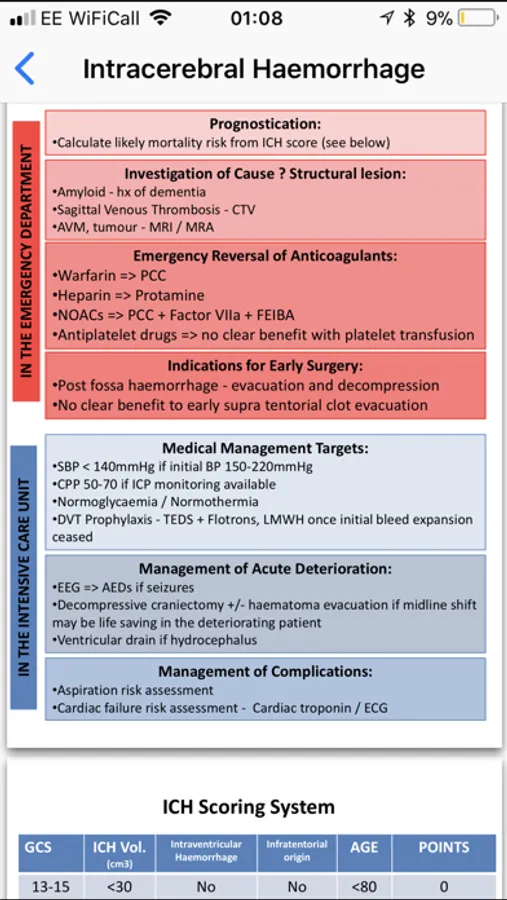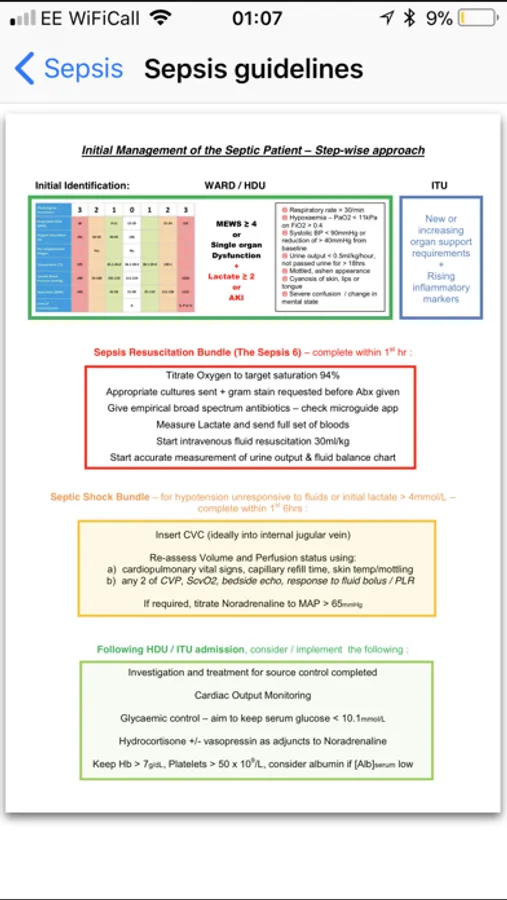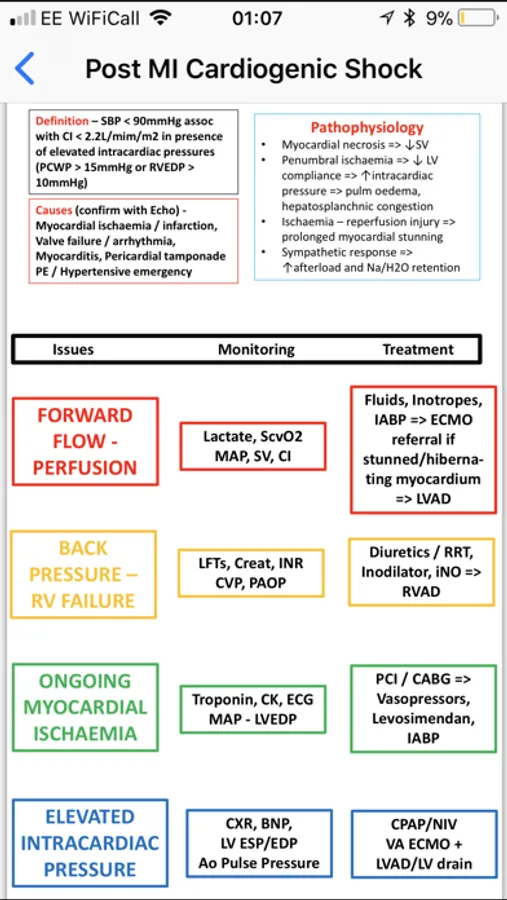In this critical care handbook app, users can access concise modules, guidelines, and algorithms to support clinical decision-making. Includes over 80 illustrations, emergency protocols, evidence-based content, and links to educational resources.
AppRecs review analysis
AppRecs rating 4.3. Trustworthiness 45 out of 100. Review manipulation risk 20 out of 100. Based on a review sample analyzed.
★★★★☆
4.3
AppRecs Rating
Ratings breakdown
5 star
75%
4 star
25%
3 star
0%
2 star
0%
1 star
0%
What to know
⚠
Rating authenticity concerns
High rating concentration (75% 5-star) in sampled ratings
About iCU Notes
iCU Notes is a critical care handbook aimed at all clinicians, nursing staff and allied health professionals who work in critical care, as well as those working on acute medical and surgical wards.
It is designed to be used as a pocket guide to improve knowledge and understanding of critical care concepts.
Key features :
*11 modules covering theoretical and practical aspects of general and emergency critical care
*Content alphabetised for ease of use
*Concise, find-it-fast format with additional smart search function to speed information finding
*Over 80 colour illustrations to clarify monitoring and therapeutic techniques in critical care
*Over 30 compact clinical ICU guideline overviews
*18 emergency algorithms including ALS, obstetric, sepsis and difficult airway (DAS) algorithms
*A complete section on differential diagnoses in critical care including organ support alarms
*A complete section on current management strategies in critical care as well as additional modules on microbiology and critical care pharmacology
*Evidence based recommendations by the ESICM included in red text within appropriate subsections
*Summaries of important papers published in hi impact factor journals over the last 7 years
*A list of educational online resources that can be accessed directly from within the app
*More modules planned in the future to eventually cover all clinical and non-clinical aspects of critical care
*It's completely free !
Module Content
BASIC CRITICAL CARE MODULE
Covers all basic principles of critical care, including:
Assessment of the critically ill patient
Basic CNS Pathophysiology
Neuromonitoring
Basic Cardiovascular Physiology
Fluids, Inotropes and Vasopressors
Cardiovascular Monitoring
Acute Liver Failure
Nutrition
Sepsis
Acute Renal Failure and Renal Replacement Therapy
Basic Respiratory support and monitoring
MANAGEMENT and TREATMENT ALGORITHMS MODULE
CNS: Meningitis, GBS, Encephalopathy - Septic / Hepatic, SAH, Critical Care Neuromyopathy, Myasthenia Gravis
CVS: Persistent sinus tachycardia, AF, LVF, Bradycardia, Shock, SBE, RVF , Hypotension, Diastolic Dysfunction, Cardiac Arrest, Hypertensive Crises
DRUGS and TOXINS: Opiate infusion withdrawal, Poisoning, Cocaine, ETOH, Isopropyl Alcohol
ENDOCRINE: DKA, Hyponatraemia, Hypothyroidism, HHS, Addison's Disease, Diabetes Insipidus
GIT: GI Bleed, Nutrition, TPN and EN, Re-feeding syndrome, Abdominal Compartment Syndrome
HAEM: DIC, HIT, Jehovah's Witness,
Bleeding , Coagulopathy of Trauma, Sickle cell disease
INFECTION: Care Bundles, Malaria, Necrotising Fasciitis, Severe Sepsis, Ventilator Associated Pneumonia, Pyrexia on ITU
OBSTETRICS: Eclampsia, PPH, HELLP, Pre-eclampsia
RENAL: ARF, Drug handling in renal failure, Metabolic Acidosis, Haemofiltration, Haemodialysis, Complications of CRF
RS: Ventilator Modes, Tracheostomy, Weaning, ARDS, Bronchopulmonary fistula, COPD/Asthma, CAP, Bronchiectasis, Lobar Collapse, Pneumothorax, PE, Upper Airway Obstruction, VAP, Pleural Effusion, Haemoptysis
TRAUMA: Rhabdomyolysis, Extremity Injury, Chest Trauma, Pulseless limb, Pelvic Trauma, TBI, Spinal Cord Injury, Burns, Blast Injuries, Abdominal Trauma, Neck trauma
VASCULITIS: SLE, Wegener's Granulomatosis
EMERGENCIES MODULE
Covers ALS, DAS Obstetric and Sepsis management guidelines and algorithms
CAUSES and DIFFERENTIAL DIAGNOSES MODULE
Over 180 lists of causes and differential diagnoses covering common conditions seen on the ICU and grouped under the following headings :
Organ systems
Biochemistry
Organ support alarms
Infection (inc. HIV)
Trauma
New Modules:
MICROBIOLOGY MODULE
Covering the most important organisms associated with critical care admissions, within the following genii:
Bacteria
Fungi
Viruses
FORMULARY MODULE
Covers the class, mode of action, route and dose of administration, excretion, indications, side effects and major contraindications of the drugs most frequently used in critical care
Author: Murali Thavasothy
Developer: Dal Sandhu
It is designed to be used as a pocket guide to improve knowledge and understanding of critical care concepts.
Key features :
*11 modules covering theoretical and practical aspects of general and emergency critical care
*Content alphabetised for ease of use
*Concise, find-it-fast format with additional smart search function to speed information finding
*Over 80 colour illustrations to clarify monitoring and therapeutic techniques in critical care
*Over 30 compact clinical ICU guideline overviews
*18 emergency algorithms including ALS, obstetric, sepsis and difficult airway (DAS) algorithms
*A complete section on differential diagnoses in critical care including organ support alarms
*A complete section on current management strategies in critical care as well as additional modules on microbiology and critical care pharmacology
*Evidence based recommendations by the ESICM included in red text within appropriate subsections
*Summaries of important papers published in hi impact factor journals over the last 7 years
*A list of educational online resources that can be accessed directly from within the app
*More modules planned in the future to eventually cover all clinical and non-clinical aspects of critical care
*It's completely free !
Module Content
BASIC CRITICAL CARE MODULE
Covers all basic principles of critical care, including:
Assessment of the critically ill patient
Basic CNS Pathophysiology
Neuromonitoring
Basic Cardiovascular Physiology
Fluids, Inotropes and Vasopressors
Cardiovascular Monitoring
Acute Liver Failure
Nutrition
Sepsis
Acute Renal Failure and Renal Replacement Therapy
Basic Respiratory support and monitoring
MANAGEMENT and TREATMENT ALGORITHMS MODULE
CNS: Meningitis, GBS, Encephalopathy - Septic / Hepatic, SAH, Critical Care Neuromyopathy, Myasthenia Gravis
CVS: Persistent sinus tachycardia, AF, LVF, Bradycardia, Shock, SBE, RVF , Hypotension, Diastolic Dysfunction, Cardiac Arrest, Hypertensive Crises
DRUGS and TOXINS: Opiate infusion withdrawal, Poisoning, Cocaine, ETOH, Isopropyl Alcohol
ENDOCRINE: DKA, Hyponatraemia, Hypothyroidism, HHS, Addison's Disease, Diabetes Insipidus
GIT: GI Bleed, Nutrition, TPN and EN, Re-feeding syndrome, Abdominal Compartment Syndrome
HAEM: DIC, HIT, Jehovah's Witness,
Bleeding , Coagulopathy of Trauma, Sickle cell disease
INFECTION: Care Bundles, Malaria, Necrotising Fasciitis, Severe Sepsis, Ventilator Associated Pneumonia, Pyrexia on ITU
OBSTETRICS: Eclampsia, PPH, HELLP, Pre-eclampsia
RENAL: ARF, Drug handling in renal failure, Metabolic Acidosis, Haemofiltration, Haemodialysis, Complications of CRF
RS: Ventilator Modes, Tracheostomy, Weaning, ARDS, Bronchopulmonary fistula, COPD/Asthma, CAP, Bronchiectasis, Lobar Collapse, Pneumothorax, PE, Upper Airway Obstruction, VAP, Pleural Effusion, Haemoptysis
TRAUMA: Rhabdomyolysis, Extremity Injury, Chest Trauma, Pulseless limb, Pelvic Trauma, TBI, Spinal Cord Injury, Burns, Blast Injuries, Abdominal Trauma, Neck trauma
VASCULITIS: SLE, Wegener's Granulomatosis
EMERGENCIES MODULE
Covers ALS, DAS Obstetric and Sepsis management guidelines and algorithms
CAUSES and DIFFERENTIAL DIAGNOSES MODULE
Over 180 lists of causes and differential diagnoses covering common conditions seen on the ICU and grouped under the following headings :
Organ systems
Biochemistry
Organ support alarms
Infection (inc. HIV)
Trauma
New Modules:
MICROBIOLOGY MODULE
Covering the most important organisms associated with critical care admissions, within the following genii:
Bacteria
Fungi
Viruses
FORMULARY MODULE
Covers the class, mode of action, route and dose of administration, excretion, indications, side effects and major contraindications of the drugs most frequently used in critical care
Author: Murali Thavasothy
Developer: Dal Sandhu


